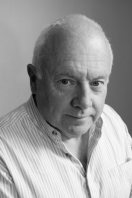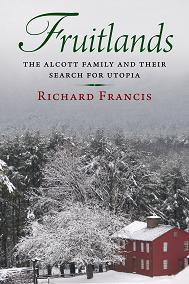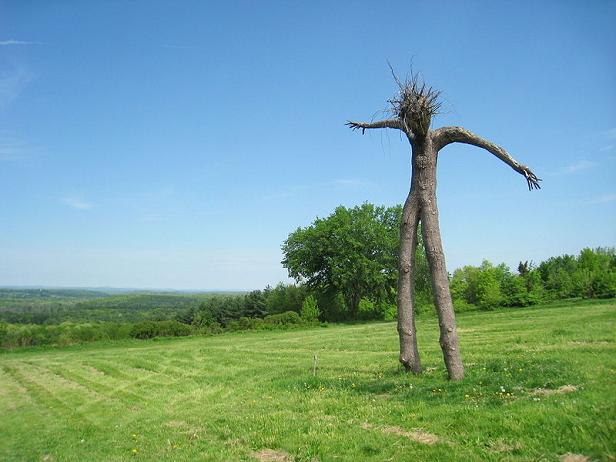Finding Fruitlands: An Interview with Richard Francis Books
Books, Interviews, New in Ceasefire - Posted on Tuesday, November 8, 2011 8:00 - 0 Comments
By JP O’Malley
Landscape with sculpture by Joseph Wheelwright (Photo: www.jenjablonsky.com)
Richard Francis’ “Fruitlands: The Alcott Family and Their Search For Utopia” is an insightful account of one of history’s most unsuccessful, but significant utopian experiments.
‘Fruitlands’ was established in Massachusetts in 1843 by Bronson Alcott and Charles Lane. In an exclusive interview, Francis talks about this bizarre experiment: a mix of the irrational, absurd, comical, and at times, towering intellectual foresight.

Richard Francis: An Interview
Conducted for Ceasefire by JP O’Malley
JP O’Malley: The Frutilands was a utopian experiment that arose from the Transcendentalist movement in New England. What were the guiding principles behind Transcendentalism?
Richard Francis: The movement is a kind of American variation on Romanticism; it’s a form that Romanticism took when it hit America really, which is a few years after it was at its peak in Europe.
They didn’t believe in the superstructure of Christianity or the Gospel miracles. Instead they held the belief that life is a miracle, and they developed the notion that Christ was just a human being, so we are all potential Christs. There was a sort of enforcement of the individual potency within it.
JPO: The idea of a utopian society was quite prevalent around this time, in particular in New England, why so?
RF: There is always that New England tradition of creating societies from the ground up, from The Puritans and the Pilgrim Fathers. I think that’s a sort of American idea in general that you can sort of just rethink society from scratch, and I think coupled with that, from this period- in the1830s- there was a recoil of what was happening in America, which was very sudden urbanisation, industrialisation, with all the potential problems that they brought with them: poverty, social inequality, pollution, bad living conditions and so on. So on the one hand there was this whole new American idealism, of how you start a new world, and on the other hand there was a very unsatisfactory state of affairs- that more socially radical people at the time recognised-as they saw these big cities swelling up, and they witnessed the oppression of working people.
JPO: What was the Fruitlanders attitude towards the family unit in society?
RF: When you think about how to restyle society, family is the basic unit for most people. Certain radicals within The Fruitlanders thought the family was a dead end, because it made people into selfish units, and stopped them cooperating with society at large. This was something that Marx would discuss a few years later when he began his work also.
JPO: What was their attitude towards sex outside of marriage?
RF: On the whole they recoiled from sex. They felt it was very imperfect.
The English Transcendentalists thought that sex had to be a purified activity, because you could overcome original sin in the inheritance of guilt and sin, if only you could perform sex in a very pure-minded way. They had this idea that you should go about sex by only exposing yourself to extreme climatic conditions, performing gymnastic exercises and reading a lot of poetry!
JPO: You talk in the book about how the Fruitlanders’ ideas on nature –despite their fundamental Christian beliefs- are similar to Darwinism?
RF: The whole notion of the Garden of Eden was that at one stage in human development people had lived harmoniously with nature. There was the notion that nature was a single system, which, of course when you put that on a time scale becomes Darwinism- obviously the Fruitlanders didn’t do that- but I think they had a picture of the web of life.
JPO: The Fruitlanders held anarchist beliefs. Do you think this inspired other radical ideas that followed in American History?
RF: Charles Lane wrote a series of articles which are actually a kind of anarchist agenda-how you leave society, how society should be rebuilt by sort of breaking down the larger structures and going right back to the individual person, and then rebuilding it from a cluster of like minded people. That was in 1843, a few years later, Thoreau wrote his famous essay on Civil Disobedience. I would argue that Alcott and Lane were the great engines of ideas that have gone through history since their time. Some of their civil disobedience notions inform things like Martin Luther King’s strategy.
JPO: So the Fruitlanders were quite forward thinking in their ideologies, but some of their theories were bizarre. They thought it was immoral to use manure on farms for example?!
RF: They believed that you should only eat living things, not dead things, and felt that manure embodied the past. Seen in more historical terms, Lane was saying that manure lead to over-cropping, over-cropping meant that other people didn’t have to have subsistent farming, because other people did it for you. This led ultimately to industrialisation- and all the abuses of the period- pollution and eventually climate change. So although there is a sort of bonkers element to a lot of the thinking behind the people of the Fruitlands, actually that analysis rings true today in many ways. There is always that peculiar nature of the bizarre and eccentric on one side, and the very perceptive on the other.
JPO: You mention Ralph Emerson in the book, how heavily was he involved in Fruitlands?
RF: Emerson was always helping The Fruitlanders informally, as they were his friends. However, he was never interested in indulging in this utopian experiment. He never really bought into the Utopian model of any sort. He seems completely sane in comparison to the others, but he was very conservative: he had this notion that there is a different order within the apparent order in society, but he didn’t think you have to be radical or opt out to find it. He thought it was really a matter of looking into yourself and getting the sense of harmony by a mystical process of self examination.
JPO: What attracted you to writing about utopian societies?
RF: Within Utopian thought you can find encapsulated lots of assumptions about human relationships and about the nature of society in a very intense way because these people are living ‘deliberately’, as Thoreau put it, choosing how to live their lives. They are trying to work out what the relationship should be between husband and wife, between parents and children, and people who don’t have blood relationships, it’s all up for grabs, and I find that very exciting.
 JPO: Why do you think Utopian ideals have been more prevalent in the US?
JPO: Why do you think Utopian ideals have been more prevalent in the US?
RF: In America, I think they have the idea that maybe their history is a slight mythology. There was a moment when Europeans chose to go there, and it feels like a formal moment when you construct a civilisation, so that kind of gives people the idea that civilisation is there to construct.
Fruitlands: The Alcott Family and Their Search for Utopia [Paperback]
Richard Francis
Paperback: 344 pages
Yale University Press (1 Nov 2011)




Leave a Reply